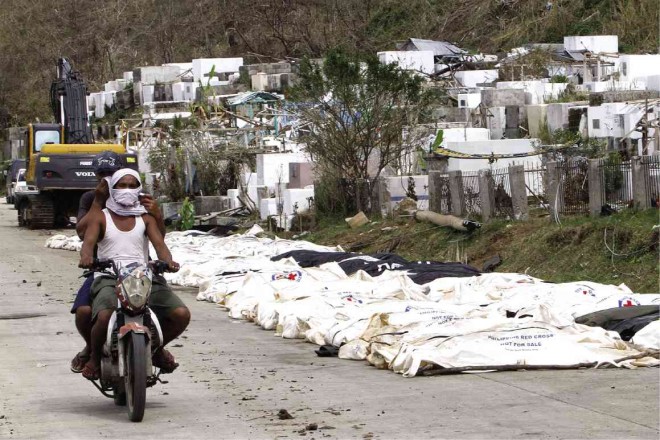Firemen take on grisly task of searching for bodies

BODIES line a street in Barangay Basper in Tacloban City days after Supertyphoon “Yolanda” struck on Nov. 8. RAFFY LERMA
TACLOBAN CITY – Now many kilometers away from his home in Sorsogon City, Sorsogon province, fireman Melvin Cañares briskly pulled up his boots, fitting his socks snugly inside and making sure that there were no gaps between the seams.
Next, he put on his armbands and gloves, again making sure no portion of his skin would be exposed to the elements and to dead bodies that he has to retrieve from the debris that Supertyphoon “Yolanda” left in Tacloban City, Leyte province.
Cañares, who holds the rank of fire officer 1, and his 14 other comrades in the search and rescue unit (SRU) of the Bureau of Fire Protection Bicol, under Senior Insp. Glen Rodriguez, have been performing this routine every day since Saturday, November 9, after Yolanda hit the Visayas and claimed thousands of lives in a devastation unheard of in recent times.
On Tuesday, Nov. 19, Cañares turned 25 years old but he said he did not feel like celebrating amid the stench of death and grief in the city.
“We have been here since Day One,” he said in an interview on Thursday.
“This is my first retrieval operation since becoming a fireman three years ago,” he added.
After breakfast at 7:30 a.m., the group moved on to the Tacloban seaport where they met with an SRU from Korea with whom Cañares planned out the day’s operation. Since at least two days ago, the two groups have been working together.
They were divided into two groups, one went with the Philippine Navy and Philippine Air Force aboard rubber boats for retrieval operations along the coasts and the other went with the Philippine Army and the Department of Public Works and Highways (DPWH) to comb through the interior streets of the city.
Cañares said his group, the ground search and retrieval team, usually gets an average of 20 bodies per day.
Combining their efforts with the coastal team, they get an average of around 50 bodies every day.
Doctor Nathaniel Rempillo, Team Albay’s Tacloban mission commander, to which Cañares’ group is attached, said they had already recovered at least 599 bodies since Nov. 9.
“At first, I was shocked. I mean, seeing all those bodies, most of them already faceless, is quite shocking. But after the first few days, I became used to it,” Cañares said.
He said he and his teammates always bring biscuits and water with them whenever they go out because their operations may sometimes take an entire day. They sometimes have to skip lunch.
Cañares said finding the bodies was easy because they only had to follow the smell of decaying flesh or ask residents of the villages where their homes used to be.
“Our goal is to rid the city of as many dead as we can because the people are already complaining of the smell,” he said.
He added he no longer feared holding the dead now because he had gotten used to the sight and odor.
However, they still fear contamination by secretions from the dead bodies.
To avoid this, they take extra care in getting dressed up in the morning. Masks, gloves and disinfectants are important tools of the trade.
After putting the corpses in body bags, they haul them into the DPWH truck that takes the bodies to the mass grave in Barangay Basper, Tacloban City.
At the end of the day, he and his comrades return to their temporary barracks in Leyte Sports Complex where Team Albay set up an office for the entire duration of the mission to eat dinner and take baths before going to sleep.
“Sometimes, some of the residents here would approach us and ask about a missing relative. They request that we find these people. We find them, of course, but they are already dead,” he said.
He said it saddened him that none of the missing persons turn up alive.














